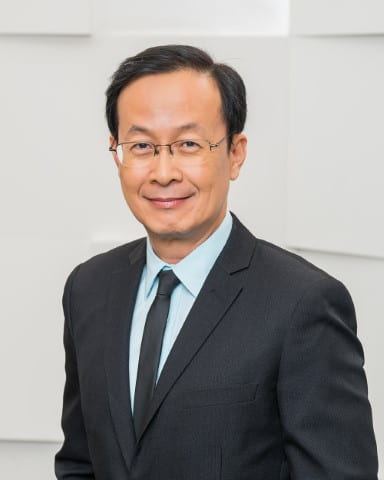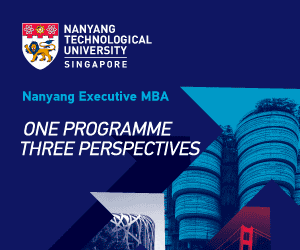Graduate Studies Blog

NANYANG EXECUTIVE EMBA
AGILE LEADERSHIP IN TIMES OF CRISES
In late March 2020, the CEO of the Marriott chain of hotels, Mr Arne Sorenson, addressed his staff although he was undergoing chemotherapy for pancreatic cancer. He said that this was something he had to do as a leader.
In the six-minute long video, Mr Sorenson revealed that the Marriott group was closely monitoring the situation and coming up with plans to mitigate “the most devastating period in the history of the 92-year old Marriott” brought on by the COVID-19 outbreak.
In another recent online interview with Bloomberg, Mr Sorenson shared about the “emotional rollercoaster” he experiences daily as he feels the anguish of the people whose lives have been profoundly impacted, and how he continues to “navigate in search of tools to deal with the crisis”.
“Despite the grim news delivered in both of his appearances, Mr Sorenson’s messages was lauded for being authentic and empathetic. The COIVD-19 outbreak can be likened to a Black Swan event of unprecedented, extreme consequences. We need leaders who can practice an Agile leadership approach in these tough times,” explains Associate Professor Tan Joo Seng from Nanyang Business School, Nanyang Technological University (NTU, Singapore).
The current pandemic does not just take a toll on the tangible output of a business. It also places a psychological strain on the workforce—stoking fears of uncertainty, which more often manifest into productivity slowdown. It is at times like this that agility calls upon the leaders to translate their principles into action. Agile leaders, thus, must continually adapt their leadership style to changes, as, by doing so, they adopt a more resilient approach to crisis management.
“Agile is more than a mindset: it is also a modality, in which the agile mindset is expressed or demonstrated. Leaders with an agile modality demonstrate authenticity and empathy—critical and defining qualities of leading in times of massive disruption,” explains Associate Professor Tan.
“The twin modalities of authenticity and empathy can create agility at scale where new ideas and novel solutions, to cope with the crisis, evolve through collaborative efforts.”
These leadership qualities can empower executives to enable agile communication in the form of open dialogue and healthy feedback as clear communication is key to Agile success. Engaging these characteristics in times of crisis can help leaders signal change across the management, rethink new strategies, and assuage concerns among the employees.
“Leaders who show authenticity have the courage to be vulnerable and transparent. These leaders are honest in keeping people informed and updated about the situation even though it is challenging, and they may not know when and how the crisis will end. Similarly, empathy is crucial in leadership to maintain morale during a crisis,” Associate Professor Tan explains.
The True Qualities of an Agile Leader
The situation faced by the Marriott Group is not unique. Many struggling businesses across the spectrum stare at an important question—as so much is still unknown about the unfolding COVID-19 crisis, how do leaders continue to engage and empower the people they lead?
Associate Professor Tan sheds some light on how executives can mould and benefit from an agile mindset in the face of adversity by “using the ‘M&M’ (Mindset & Modality) approach to leading in the times of crises.”
The M&M approach is part of the curriculum taught in the “Leadership 4.0 – Leading in Age of Disruption” course in the Nanyang EMBA programme. It was developed based on two years of research conducted with senior leaders from diverse industries.
“Agile thinking is more than a mindset: it is also a modality, in which the agile mindset is expressed or demonstrated. Leaders with an agile modality demonstrate authenticity and empathy—critical and defining qualities of leading in times of massive disruption.”
Leaders who leverage this approach have the ability to “think about how they can make sense of what is going on, identify the degree of uncertainty they are experiencing, and find out how they can adapt as the situation evolves”. Consequently, they are highly adaptive to challenging circumstances as they understand what it takes to scale agility despite existing disruptions in the workflow.
“Leaders with an agile mindset can change plans and work schedules as well as adopt an iterative approach to dealing with the disruption to work and business, including recalibrating business continuity plans (BCPs) to timely address unanticipated obstacles ahead,” he explains.
To put things into context, he shares a couple of examples of how companies across diverse industries have stepped up to the plate to help their immediate communities deal with the crisis. The F1 Mercedes team of engineers in the UK has worked with engineers from University College London (UCL) to create respiratory aids for Coronavirus patients.
This is a great example of agile collaboration. With the team working round the clock, one of them was sent out to stock up on essential supplies, including toiletries and change of clothes. UCL engineers slept at a hotel next door to MechSpace. The racing mentality of the Mercedes team drove the process forward at breakneck speed.
The M&M approach can also be observed here in Singapore. For example, Mr Tan Ming Liang—the CEO of Razer Singapore, the world-leading lifestyle gaming company—has been redeploying some of his manufacturing lines to produce “a couple of million certified surgical masks” within just a month.
On Twitter, Mr Tan announced his plan to donate the surgical masks to the frontline healthcare workers around the world to help mitigate the extreme shortage of Personal Protective Equipment (PPE). Razer’s designers and engineers have been working 24-hour shifts to maximise the production at the converted lines. He said, “We are committed to contributing our extra time, resources, effort, and talent towards the fight against COVID-19.”
Agile Leadership in Action
The COVID-19 crisis has caused a major disruption in our global supply chains—putting tremendous pressure on businesses across the globe to maintain their operations amidst shutdowns and severe restrictions on movement. In these unpredictable and turbulent times, leaders are expected to rise to the occasion and respond to change with agility. More dynamic capabilities in the areas of risk management, crisis management, and business resilience can make all the difference in the fight against the virus.
To create greater organisational agility in the wake of the outbreak, Associate Professor Tan advises executives to explore what they can learn from the Agile movement. He asserts, “The evolutionary development, adaptive planning, and continuous improvement, common in Agile software development, would enable these leaders to have both flexible and faster responses to disruptive changes caused by the pandemic.” Capabilities such as developing a more dynamic approach to risk management, crisis management, and business resilience would be critically needed in the fight against the virus.
“Agile leaders can sense when to pivot, and in pivoting, it is not just repurposing existing facilities and capabilities; it is also demonstrating adaptability, resilience, authenticity, and empathy.”
Authenticity and empathy are two leadership currencies that any executives need to establish a connection with people at a fundamental level during the time of crisis. Possessing both these traits showcase that leaders are human beings capable of experiencing anxiety and uncertainty similar to others.
“Agile leaders can sense when to pivot, and in pivoting, it is not just repurposing existing facilities and capabilities; it is also demonstrating adaptability, resilience, authenticity, and empathy,” Associate Professor Tan concludes.

Associate Professor Tan Joo Seng’s expertise on global leadership, cultural intelligence, cross-cultural negotiation, business model innovation, and leadership in the Age of Disruption is highly sought after by multiple Fortune 500 companies. He is an award-winning educator with extensive consulting and training experience in diverse industries. His current research relates to how businesses and leaders address opportunities and challenges unleashed by the Fourth Industrial Revolution.
The Nanyang Executive MBA is a part-time 13-months programme that is designed for senior leaders aspiring to innovate and transform the way they lead. The programme aims to embrace the connection between business, technology, and innovation to deliver a relevant curriculum to business leaders to excel in global environments and adapt to each new wave of digital change.
Download the Nanyang Executive MBA brochure
Click here to learn more about the Nanyang Executive MBA programme or contact us at execmba@ntu.edu.sg.


